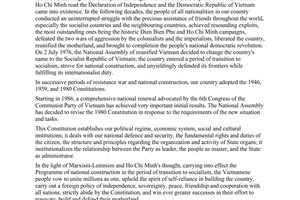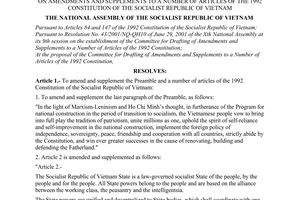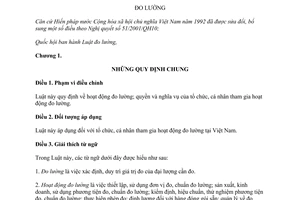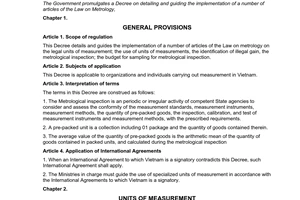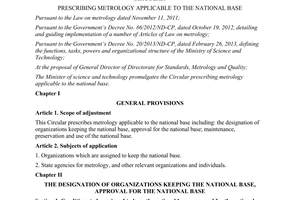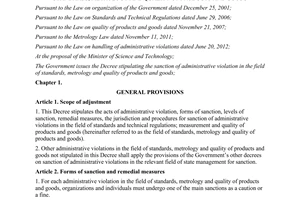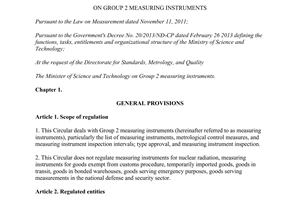Nội dung toàn văn Law No. 04/2011/QH13 on measurement
|
NATIONAL ASSEMBLY
OF VIETNAM |
SOCIALIST
REPUBLIC OF VIETNAM |
|
Law No.04/2011/QH13 |
Hanoi, November 11, 2011 |
LAW
ON MEASUREMENT
Pursuant to the Constitution 1992 of the Socialist Republic of Vietnam which had been amended under the Resolution No.51/2001/QH10;
The National Assembly of Vietnam hereby issues the Law on Measurement.
Chapter 1.
GENERAL PROVISIONS
Article 1. Scope
This Law covers measurement, rights and responsibilities of entities participating in measurement.
Article 2. Regulated entities
This Law applies to entities participating in measurement in Vietnam.
Article 3. Interpretation
For the purpose of this Law, terms herein shall be construed as follows:
1. Measurement refers to determination of a physical quantity.
2. Measurement activity refers to establishment and application of units of measurement and standards, production, trading, testing, inspection and calibration of measuring instruments, quantification of pre-packed goods; measurement control; education, training, consultation, research and development, and application of measurement technologies.
3. International system of units (hereinafter referred to as “SI”) refers to a metric system comprising coherent system of measurement of unit with unit name and unit symbols that are approved by the General Conference on Weights and Measures.
4. Standard refers to a technical reference for a system of weights and measures against which all other measuring devices are compared.
Reference material refers to a material which is sufficiently homogeneous and stable with respect to one or more specified properties. Reference materials are used in calibration and inspection of measuring instrument and methods or analysis of characteristics and constituents of other materials and substances.
5. Measuring instruments refers to measuring devices for measurement process.
6. Measurement process refers to a set of operations used to determine the value of a quantity.
7. Pre-packaged goods refer to goods that have been already packed, quantified and has its quantity written on labels without the presence of customers.
8. Inspection refers to a process of determination and assessment of measuring instrument specifications to make sure that such measuring instrument satisfies technical measurement requirements.
9. Calibration refers to a process of determination and establishment of relation between measured values by measurement standard, measuring instrument and quantity.
10. Testing refers to the determination of one or more specifications of measuring instrument or standards.
11. Technical measurement requirement refers to a set of technical requirements of measurement standards, instruments, measurement processes for quantification of pre-packaged goods announced by an entity or State competent authority.
12. Designated testing, inspection or calibration body refers to an agency that meets all requirements prescribed by this Law and relevant laws and is named on the list of agencies providing testing, inspection or calibration services by the State competent authority in charge of measurement.
13. Quantity mark refers to a sign as a statement that the quantity of pre-package goods is conformable to technical measurement requirements.
Article 4. Principles of measurement
1. The accuracy and consistency must be assured.
2. Measurement activities shall:
a) Take place transparently, objectively, precisely and fairly to all sides including sellers, buyers, payers and service providers;
b) Be safe, environmentally-friendly and healthy;
c) Facilitate both domestic and international trade;
d) Ensure lawful rights and interests of measuring entities;
dd) be conformable to international practices;
e) Be conformable to agreements between parties on the basis of conformity with regulations hereof and other relevant laws.
Article 5. State’s policies on measurement
1. The State shall focus on compiling and maintaining national measurement standard system and providing sufficient funding for application of the national measurement standard which is invested and controlled by the State.
2. The State shall invest in facilities and infrastructures for the purpose of State management of measurement encourage individuals and organizations to invest in facilities, infrastructure and human resources, and promote involvement of private sectors in the following measurement activities:
a) Setting up and maintaining measurement standards;
b) Testing, calibrating and inspecting measuring instruments and standards
c) Producing measuring instruments and measurement standards;
d) Providing training and consulting services, doing scientific researches, developing and applying measurement technologies.
3. Human resources in measurement shall be prioritized and developed; scientific research, development and application of measurement technology should be promoted; and laws on measurement shall be widely disseminated.
4. Every entity should apply legal units of measurement instead of other types of units of measurement; and quality control system in measurement in conformity with national and international standards. Testing, inspection and calibration bodies that have their quality control system for state management of measurement recognized and certified shall be prioritized.
Article 6. International cooperation in measurement
1. International cooperation in measurement shall be promoted on the basis of independence, sovereignty and equality and mutual benefits.
2. International cooperation in measurement shall be promoted by:
a) Signing International Agreements on measurement, recognition of measurement, testing, inspection and calibration results between Vietnamese bodies and foreign country's bodies under international laws, and joining international measurement coalitions.
b) Executing international programs and projects;
c) Exchanging measuring experts and officers with foreign countries and international organizations;
d) Holding seminars, conferences; conducting scientific researches, technology application and transfer;
dd) Cooperating in settling disputes
Article 7. Prohibited acts
1. Deliberate detriment to national interest, defense and security, public order and lawful rights and interest of entities by taking advantage of measuring
2. Deliberate falsification of measuring instrument and measuring results.
3. Deliberate provision and falsification of testing, inspection and calibration results of measuring instrument and standards.
4. Acts of forging, erasing and editing quantity markings, inspection marks, seals and certificates.
Chapter 2
UNITS OF MEASUREMENT AND MEASUREMENT STANDRADS
SECTION 1. UNITS OF MEASUREMENT
Article 8. Classification of units of measurement
1. Units of measurements consist of legal units of measurement and other types of units of measurement.
2. Legal units of measurement include:
a) SI base units;
b) SI derived units;
c) Decimal multiples and decimal submultiples of SI units prescribed in point a and b of this clause;
d) Units of measurements other than SI units but conformable to international conventions and national practices;
dd) Units of measurement that are made by combination of those prescribed in point a, b, c and d of this clause.
3. SI base units comprise:
a) Metre (m) for length;
b) Kilogram (kg) for weight;
c) Second (s) for time;
d) Ampere (A) for electric current;
dd) Kelvin (K) for temperature;
e) Mole (mol) for amount of substance;
g) Candela (cd) for luminous intensity
4. Legal units of measurement shall be specified by the Government.
5. Other units of measurement comprise traditional units of measurement and those that are not specified in clause 2 of this Article.
Article 9. Use of units of measurement
1. Legal units of measurement shall be used in:
a) Documents issued by State authorities;
b) Measuring instruments used in inspection, testing, judicial expertise and other official duties;
c) Pre-packaged goods quantity marking;
d) Manufacture, trading and importation of measuring instruments as stipulated in clause 2 Article 16 hereof;
dd) Activities for community and environmental protection;
2. Other units of measurement shall be used according to prior agreements, other than those prescribed in clause 1 of this Article.
Any conflict arising in connection to use of legal units of measurement and others occurs; legal units of measurement shall apply.
3. This Article shall be specified by the Government.
SECTION 2. MEASUREMENT STANDARDS
Article 10. Measurement standard system
1. National measurement standard is the highest measurement standard of a country and is used to inspect measurement values by remaining standards.
2. Primary measurement standard is a standard of measurement which is used to inspect and calibrate measurement values by other secondary measurement standards.
3. Working measurement standard is a standard of measurement which is used to inspect, calibrate and test measuring instruments.
Article 11. General requirements for measurement standards
1. Technical measurement requirements shall be specified on the measurement standard or product labels or attached documents.
2. Measurement standard specifications shall be conformable to technical measurement requirements announced by organizations and individuals or stipulated by State competent authorities.
Article 12. Requirements for national measurement standards
1. National measurement standards shall meet all requirements in Article 11 hereof.
2. National measurement standards shall be set up according to the national development planning.
3. National measurement standards shall be approved, conserved and applied by an accredited national standard respiratory.
4. The accredited national standard respiratory shall periodically revise, calibrate and compare the national measurement standard with an international standard.
5. The Prime Minister has the power to approve national measurement standard development plans.
6. The Minister of Science and Technology has the power to approve the national measurement standard, designate the national standard respiratory and specify clauses 3 and 4 of this Article.
Article 13. Requirements for accredited national standard respiratory
The accredited national standard respiratory shall:
1. Be a judicial entity
2. Have qualified personnel, facilities and infrastructures available to:
a) Conserve, maintain and apply the national standard under regulations of laws;
b) Periodically calibrate and compare the national standard with international standards under clause 4 Article 12 of this Law;
c) Revise, calibrate and compare the national standard with other standards which are less accurate;
d) Apply and do scientific research and development of measurement technologies, introduce measures for conservation and maintenance of national standards; introduce measurement techniques to improve accuracy of other measurement standards.
3. Set up calibration diagrams and procedures in conformity with national and international standards.
4. Establish and maintain management systems to perform measurement activities stipulated in clause 2 of this Article.
5. Be recognized to be a national standard respiratory.
Article 14. Requirements for primary and working standards
1. The primary and working measurement standard shall meet all requirements in Article 11 hereof.
2. Primary and working measurement standards shall be established by local competent authorities or organizations.
3. Conservation and application of primary and working measurement standards shall be carried out in accordance with regulations by Heads of local competent authorities or head of standard respiratory.
4. Specifications of primary and working measurement standards shall be conformable to technical measurement requirements which are made public after being periodically calibrated or compared with international standards or others with higher degree of accuracy.
5. The calibration and comparison of primary and working measurement standards shall be carried out at calibration bodies that meet requirements prescribed in Article 25 hereof.
6. Working measurement standards that are directly applied to inspect measuring instruments as stipulated in clause 2, Article 16 shall be calibrated at the recognized calibration bodies and shall be certified as conformable to technical measurement requirements.
7. The Minister of Science and Technology shall stipulate procedures for certification of working measurement standards as stipulated in clause 6 of this Article.
Article 15. Requirements for reference materials
1. Reference materials shall be conformable to measurement standards prescribed in Articles 11, 12 and 14 hereof, and shall:
a) be homogeneous and stable, and have their properties conformable to stipulated or published technical measurement requirements;
b) Have property values of reference materials and measurement uncertainty of such property values certified;
c) Undergo experiments or tests or comparison as the basis for certification of property values of reference materials at testing bodies.
2. Reference materials which are directly applied to inspect measuring instruments specified in clause 2 Article 16 shall be certified in accordance with clause 7 Article 14 hereof.
Chapter 3
MEASURING INSTRUMENTS
Article 16. Types of measuring instruments
1. Measuring instruments used in scientific researches, control and adjustment to technology processes, quality control or serving purposes other than those prescribed in clause 2 of this Article (hereinafter referred to as "category 1 measuring instrument ”) shall be conformable to the technical measurement requirements announced by the organization or individual.
2. Measuring instruments used to quantify goods and services in trading, payment, safety assurance, public health protection, environmental protection, inspection , judicial expertise and other official duties (hereinafter referred to as “category 2 measuring instrument ”) on the list of category 2 measuring instrument shall be conformable to technical measurement requirements stipulated by the State regulatory authority.
The Minister of Science and Technology shall make the List of category 2 measuring instruments publicly available.
Article 17. General requirements for measuring instruments
1. Technical measurement requirements shall be specified on the measuring instrument or its label or attached documents.
2. The structure of a measuring instrument shall be created to prevent external interference that may deviate measurement results.
3. Measuring instrument specifications shall be conformable to technical measurement requirements announced by organizations/ individuals or stipulated by State competent authorities.
Article 18. Requirements for category 1 measuring instruments
1. Category 1 measuring instruments shall meet all requirements in Article 17 hereof.
2. Category 1 measuring instruments shall undergo testing, inspection and calibration upon requests by State competent authorities, organizations and individuals.
3. Manufacturers, importers, exporters and users shall have testing, inspection and/or calibration bodies that meet requirements in clause 1 Article 25 hereof test, calibrate and/or inspect category 1 measuring instruments.
Article 19. Requirements for category 2 measuring instruments
1. Category 2 measuring instruments shall meet all requirements in Article 17 hereof.
2. Category 2 measuring instruments shall be controlled by one of the following means:
a) Approval of sample measuring devices as they are manufactured or imported;
b) Initial inspection prior to use
c) Periodic inspection during employment;
d) Inspection after repair
3. Approval of sample measuring instruments as stipulated point a, clause 2 of this Article shall be carried out in accordance with Article 20 hereof.
4. The inspection of sample measuring instruments as stipulated point b, c and d, clause 2 of this Article shall be carried out in accordance with clause 2 Article 21 hereof.
5. The Minister of Science and Technology shall take on responsibilities for specifying clauses 2, 3 and 4 of this Article.
Chapter 4
APPROVAL OF SAMPLE MEASURING INSTRUMENTS, INSPECTION, CALIBRATION AND TESTING OF MEASURING INSTRUMENTS AND STANDARDS
Article 20. Approval of measuring instruments
1. Sample measuring instruments shall be considered approving by the State competent authority as the basis for assessment and certification of compliance with technical measurement requirements.
2. Sample measuring instruments shall be tested prior to approval at a designated testing body.
Sample measuring instruments may be eligible for a testing reduction or exemption. The Minister of Science and Technology shall introduce regulations on reduction and exemption of measuring instrument testing.
Article 21.Inspection of measuring instruments
1. Measuring instruments shall be inspected by inspection bodies as the basis for assessment and certification of measuring instrument specifications according to technical measurement requirements.
2. Category 2 measuring instruments shall undergo initial inspection prior to use and periodic inspection during use and after repair.
Some measuring instruments shall undergo a control inspection which is held by an inspection body on the List of designated inspecting bodies.
The Minister of Science and Technology shall specify control testing and category 2 measuring instruments which require control testing.
3. Category 1 measuring instruments may be inspected upon request by relevant entities.
Article 22. Calibration of measuring instruments and measurement standards
1. Measurement standards and instruments shall be calibrated as the basis for development of the relation between measured values by measurement standard, measuring instrument and quantity.
2. The working measurement standard that is directly applied to inspect measuring instrument in category 2 must be calibrated.
3. Primary and working measurement standards other than those in clause 2 of this Article and category 1 measuring instruments may be calibrated upon request of relevant entities.
Article 23.Testing of measuring instruments and measurement standards
1. Testing bodies shall conduct tests to determine one or more technical specifications of measuring instruments and measurement standards.
2. Samples of category 2 measuring instruments must undergo a compulsory test prior approval, except for those eligible for reduction and exemption.
3. Primary and working measurement standards and category 1 measuring instruments may be tested upon request of relevant entities.
Article 24. Rules for testing, calibration and inspection
1. Testing, calibration and inspection shall be conducted independently, objectively, accurately and transparently.
2. Testing, calibration and inspection be carried out in conformity with procedures and processes announced or stipulated by the State competent authority.
3. Information, figures, calibration, inspection and testing results shall be kept confidential.
Article 25. Requirements for operation of testing, calibration and inspection bodies
1. Every calibration, testing and inspection body shall:
a) Be a judicial entity
b) Have sufficient facilities and infrastructures available for specific fields;
c) Have qualified personnel available;
d) Ensure the independence and objectivity;
dd) Establish and maintain management systems for respective fields;
e) Apply for operation to the State competent authority.
2. Every calibration, testing and inspection body that is designated to provide compulsory testing, inspection and calibration services shall meet all requirements in clause 1 of this Article.
3. The Minister of Science and Technology shall specify clause 1 of this Article and the designation of calibration, testing and inspection bodies.
Article 26. Costs of testing, inspection and calibration
1. Costs of testing, inspection and calibration are all actual reasonable expenditures on completion of assigned tasks according to scope of work, workload, characteristics and duration of testing, calibration and inspection.
2. Costs of testing, inspection and calibration comprise costs of:
a) Materials;
b) Workers;
c) Depreciation of machinery and equipment;
d) Transport
3. Costs of testing, inspection and calibration shall be determined and published in accordance with laws on prices.
Chapter 5
MEASUREMENT PROCESSES AND QUANTITY OF PRE-PACKAGED GOODS
SECTION 1: MEASUREMENT PROCESSES
Article 27. Measurement processes
1. Measurement processes used in scientific researches, technology process control and adjustment, quality control or serving purposes other than those prescribed in clause 2 of this Article (hereinafter referred to as "category 1 measurement process”) shall be conformable to technical measurement requirements announced by organizations and individuals.
2. Measurement processes used to quantify goods and services in trading, payment, safety insurance, public health, environmental protection, inspection, judicial expertise and other official duties (hereinafter referred to as “category 2 measurement processes”) shall be conformable to technical measurement requirements stipulated by the state competent authority.
Article 28. General requirements for measurement processes
1. Measuring instruments, methods, conditions and the proficiency of a person who performs measurement shall be conformable to manufacturer’s manual or technical measurement requirements announced by that entity or stipulated by the state competent authority.
2. The accuracy of a measurement result must be delivered by the measurement standard via an uninterrupted series of calibration and inspection.
Article 29. Requirements for category 1 measurement processes
1. Category 1 measurement processes shall meet all requirements in Article 28 hereof.
2. An organization and individual shall perform category 1 measurement processes when it is deem necessary.
3. The organization and individual that performs measurement process shall decide and take on responsibilities for the accuracy of measurement results through:
a) Selection and use of measuring instruments whose specifications are conformable to guidelines for measurement techniques, measuring instrument operation principles and conditions for operation; or
b) Agreements on provision of measurement services and results.
Article 30. Requirements for category 2 measurement processes
1. Category 2 measurement processes shall meet all requirements in Article 28 hereof.
2. Category 2 measurement processes shall only be carried out with category 2 measuring instruments.
3. Measurement processes shall be carried out in accordance with technical measurement requirements stipulated by the State competent authority.
The Minister of Science and Technology shall specify category 2 measurement processes.
SECTION 2: QUANTITY OF PRE-PACKAGED GOODS
Article 31. Classification of pre-packaged goods
1. Pre-packaged goods other than those on the List prescribed in clause 2 of this Article shall be controlled by technical measurement requirements announced by individuals and organizations
2. Pre-packaged goods which are sold in large quantities or has a huge value that may contain potential disputes or complaints between buyers and sellers (hereinafter referred to as “category 2 pre-packaged goods”) on the List of category 2 pre-packaged goods shall be conformable to technical measurement requirement stipulated by the state competent authority.
The Minister of Science and Technology shall introduce the List of category 2 pre-packaged goods.
Article 32. Requirements for quantity of prepackaged goods
1. The actual quantity of pre-packaged goods shall match that specified on labels or attached documents and shall be conformable to technical measurement requirements announced by the individuals or organization or stipulated by state competent authority.
2. Pre-packaged goods quantity shall be specified on its label in accordance with regulations of laws on product labeling.
Article 32. Requirements for measurement of quantity of category 1 prepackaged goods
1. The quantity of category 1 pre-packaged goods shall be conformable to Article 32 hereof.
2. The quantity of category 1 pre-packaged goods shall satisfy requirements announced by importers, producers and bear a quantity mark.
Article 34. Requirements for measurement of quantity of category 2 prepackaged goods
1. The quantity of category 2 pre-packaged goods shall be conformable to Article 32 hereof.
2. The quantity of category 2 pre-packaged goods shall be conformable to technical measurement requirements and such goods shall be attached with a quantity mark as prescribed by laws.
3. The Minister of Science and Technology shall specify technical measurement requirements of category 2 pre-packaged goods; quantity marking and issue of the certificate of eligibility to apply quantity marks on goods label prescribed in clause 2 of this Article.
Chapter 6
RIGHTS AND RESPONSIBILITIES IN MEASUREMENT ACTIVITIES
Article 35. Rights and responsibilities of entities producing and/or trading measuring instruments and/or measurement standards
1. Every entity producing and trading measuring instruments and measurement standards shall have the right to:
a) Select testing, inspection and calibration bodies to implement measurement control measures over measuring instruments and measurement standards under provisions hereof;
b)File complaints about testing, inspection and calibration results; initiate legal proceedings in case of breach of contracts signed with the testing, inspection and calibration body;
c) Lodge complaints or file a case against administrative violations and decisions made by authorities under regulations of laws.
2. Every entity producing and trading measuring instruments and measurement standards shall:
a) Take measures for measurement control over measuring instruments and measurement standards under provisions hereof prior to use;
b) Undergo inspection conducted by the State competent authority under regulations of laws;
c) Provide reliable information on specifications of measuring instrument and standards;
d) Provide instructions on transport storage conditions and usage of measuring instrument and standards;
dd) Pay costs of testing, calibration and inspection of measuring instruments and standards;
e) Undergo testing, inspection and calibration upon requests of the state competent authority.
Article 36. Rights and responsibilities of testing, inspection and calibration bodies
1. Every testing, inspection and calibration body has the right to:
a) Carry out tests, calibration and inspection in the registered fields;
b) Have their testing, calibration and inspection results recognized by the state competent authority under regulations of laws.
c) Loge complaints or file a case against administrative violations and decisions made by individuals or state competent authorities.
2. Every testing, inspection and calibration body shall:
a) Ensure the transparency and objectivity of testing, inspection and calibration, and comply with procedures for and costs of testing, inspection and calibration;
b) Keep information, results and figures confidential, unless otherwise stipulated by the State competent authority;
c) Promptly report and cooperate with the State competent authority to deal with violations;
d) Be legally responsible for testing, calibration and inspection results;
dd) Undergo inspection conducted by the State competent authority under regulations of laws;
Article 37. Rights and responsibilities of designated testing, inspection and calibration bodies
1. Every designated testing, inspection and calibration body has the right to:
a) Carry out tests, calibration and inspection in the designated fields;
b) Have their testing, calibration and inspection results recognized by the state competent authority under regulations of laws.
c) Loge complaints or file a case against administrative violations and decisions made by individuals or state competent authorities under regulations of laws.
2. Every designated testing, calibrating and inspection body shall fulfill obligations prescribed in clause 2 Article 36 hereof and shall:
a) Carry out tests, calibration and inspection upon request, unless where force majeure events occur;
b) Comply with procedures and processes for testing, calibration and inspection stipulated by the State competent authority.
Article 38. Rights and responsibilities of measuring instrument and measurement standard users
1. Every entity using measuring instruments and measurement standards shall be entitled to:
a) request the manufacturers and traders to provide information and documents on specifications, transport and storage conditions;
b) select testing, inspection and calibration bodies to implement measurement control over measuring instrument and measurement standards under provisions hereof;
c) Lodge complaints about testing, inspection and calibration results; lodge a file against breaches of contracts by testing/inspection/calibration bodies;
d) Lodge complaints or file a case against administrative violations and decisions made by individuals or state competent authorities under regulations of laws.
2. Every entity using measuring instruments and measurement standards shall:
a) Take control measures and comply with measurement requirements during use of measuring instruments and standards;
b) Follow guidelines for transport, storage conditions ad usage issued by producers, importers; stop using measuring instruments and standards and take remedy measures in case of damage;
c) Satisfy requirements for qualifications and experiences when operating category 2 measuring instruments prescribed by the State competent authority;
d) Meet all requirements and facilitate the inspection and supervision of measurement processes, methods, standards, instruments and goods quantity;
dd) Undergo inspection conducted by the State competent authority;
e) Pay costs for testing, calibration and inspection of measuring instruments and standards;
Article 39. Rights and responsibilities of pre-packaged goods producers and traders
1. Every pre-packaged goods producer and trader shall be entitled to:
a) Make quantity marks on category 1 prepackaged goods labels publicly available;
b) Lodge complaints or file a case against administrative violations and decisions made by individuals or state competent authorities under regulations of laws.
2. Every pre-packaged goods producer and trader shall:
a) Provide reliable information on the quantity of pre-packaged goods;
b) Provide instructions on transport, storage and use of pre-packaged goods;
c) Ensure that the quantity of pre-packaged goods is conformable to technical measurement requirements;
d) Leave a quantity mark on category 2 pre-packaged goods labels in accordance with regulations of laws.
dd) Undergo inspection conducted by the State competent authority.
Article 40. Rights and responsibilities of consumers
1. Every consumer shall be entitled to:
a) Be provided with reliable information on purchased goods, measuring instruments and measurement standards;
b) Request sellers to meet requirements in point Article clause 2 Article 38 hereof;
c) File a case against violations;
d) Request customer’s organizations to protect lawful rights and interests;
dd) Have other rights under regulations of laws.
2. Every consumer shall:
a) Inform the state competent authority of violations against customer’s lawful rights and interests.
b) Do not abuse the proper intention of legal arrangements for personal interests that may affect the national interests and lawful rights and interests of others.
Article 41. Rights and responsibilities of socio-professional organizations specialized in measurement
Every socio-professional organization shall:
1. Give advices and participating in compiling legislative documents, measurement plans and schemes under regulations of laws.
2. Provide consulting services, science and technology services under regulations of laws.
3. Be provided with measurement information.
4. Disseminate measurement knowledge, encourage entities to comply with laws on measurement.
5. Request inspecting bodies and state competent authority to deal with violations against laws on measurement.
Chapter 7
INSPECTION AND ACTIONS AGAINST VIOLATIONS AGAINST LAWS ON MEASUREMENT
SECTION 1. STATE INSPECTION OF MEASUREMENT
Article 42. Inspected subjects
State inspection of measurement deals with measurement standards, measuring instruments, measurement processes, quantity of pre-packaged goods, testing, and inspection and calibration services.
Article 43. Scope of inspection
1. State inspection of measurement standards deals with:
a) The compliance with requirements in Article 11 hereof;
b) The compliance with requirements for measurement standards prescribed in Article 12, 14 and 15 hereof.
2. State inspection of measuring instruments covers:
a) The presentation of instrument specifications under clause 1 Article 17 hereof;
b) The conformity of components and parts of category 2 measuring instruments with approved samples.
c) The compliance with requirements in Article 11 hereof;
d) Measuring instrument specifications under clause 3, Article 17 hereof;
dd) Storage conditions, maintenance and use;
e) The compliance with measurement requirements of measuring instruments prescribed in Article 18 and 19 hereof.
3. State inspection of measurement processes includes:
a) Applicable measuring instruments, measurement processes and conditions according to technical measurement requirements;
b) The deviation of measurement results in comparison to the permissible tolerance according to technical measurement requirements.
4. State inspection of pre-packaged goods deals with:
a) The quantity of pre-packaged goods specified on its label.
b) The actual quantity of pre-packaged goods;
c) Quantity marks
5. State inspection of testing, inspection and calibration of measuring instruments and standards deals with:
a) The obedience to regulations on inspection, testing and calibration stipulated in Article 24 hereof;
b) The fulfillment of requirements specified in Article 25 hereof;
c) The fulfillment of obligations by testing, calibration and inspection bodies prescribed in clause 2 Article 36 and designated testing, calibration and inspection bodies stipulated in clause 2, Article 37 hereof.
Article 44. Procedures for state inspection of measurement
1. Present an inspection decision prior to inspection. Where it is permitted in the inspection decision, samples may be taken prior to presentation of the inspection decision.
2. Conduct inspection according to the inspection decision.
3. Make out an inspection record.
4. Deal with violations in accordance with Article 48 hereof.
5. Submit a report to the authority making state inspection decision.
Article 45. Types of state inspection of measurement
1. The state inspection may be carried out according to a plan or program which has been approved by the State competent authority.
2. The surprise inspection may be conducted to settle disputes, complaints or violations against law on measurement or upon request of state competent authorities.
Article 46. Inspecting bodies
1. State competent authorities in measurement affiliated to the Ministry of Science and Technology shall take charge of and cooperate with relevant authorities to conduct state inspection of measurement nationwide.
2. State competent authorities in measurement affiliated to the People’s Committees of provinces shall take charge of and cooperate with relevant authorities to conduct state inspection of measurement within the province.
3. People’s Committees of districts shall, according to their functions, rights and responsibilities, take charge of and cooperate with relevant authorities to conduct State inspection of measurement within the district.
Article 47. Rights and responsibilities inspecting bodies
1. Every inspecting body has the power to:
a) set up inspectorates;
b) Give warnings to inspected entities
c) deal with violations discovered during inspection in accordance with Article 48 hereof;
d) Address complaints on decisions made by inspectorate or inspector’s acts under laws on complaints.
2. Every inspecting body shall:
a) Submit an annual inspection plan to the State competent authority for approval.
b) Issue a penalty decision within 15 days from the date of receipt of the report and request for violation tackling; and make them public via means of mass media;
c) Ensure the accuracy, transparency, objectivity and equality.
d) Preserve confidentiality of relevant documents and information until the inspection conclusion is made;
dd) Be legally responsible for decision on penalties.
Article 48. Actions against violations during state inspection
1. Where any measurement standard, process, measuring instrument, quantity of pre-packaged goods, testing, and inspection and calibration activity is found unconformable to regulations hereof, the inspectorate has the power to:
a) request the inspected entity that applies unconformable measurement standards to suspend their business activities and promptly take remedy measures;
b) request the inspected entity that uses improper measuring instruments to suspend their business activities and promptly take remedy measures;
c) request inspected entity that produce and trades pre-packaged goods to suspend their business activities and promptly take remedy measures;
d) Request the inspected entity to suspend to apply measurement process and promptly take remedy measures;
dd) request testing, inspection and calibration bodies to suspend unconformable testing, inspection and calibration and promptly take remedy measures.
2. Where any inspected entity is found commit serious violations against measurement or repeatedly commit violations after being requested to comply with clause 1 of this Article, the inspectorate shall:
a) Request the inspected entity to stop violation;
b) Seal up unconformable measurement standards, measuring instruments and pre-packaged goods;
c) promptly report to the inspecting body so that the inspecting body shall request the state competent authority to come up with solutions in accordance with regulations of laws.
Inspection documents which are considered as one of legal proofs and are submitted to the State competent authority include an official dispatch of the inspecting body, inspection record prepared by the inspectorate and other relevant documents; d) Request inspecting bodies to make name and address of offending entities and their violations public on means of mass media.
3. The competent authority shall deal with violations and publish name and address of offending entities and their violations on mass media according to request of inspectorates.
4. Where any member of the inspectorate is an inspector who is specialized in science and technology or one who is a police officer, market manager or member of a competent authority, or is designated to participate in measurement inspection, such member has the power to promptly make decision on actions against violations.
Article 49. Funding for sampling
1. Funding for sampling for the purpose of state inspection of measurement shall be specified in operation cost estimation by the inspecting body.
2. Any entity that is found commit violations against measurement shall pay all costs of sampling to the inspecting body.
3. This Article shall be specified by the Government.
SECTION 2: INSPECTION AND ACTIONS AGAINST VIOLATIONS AGAINST LAWS ON MEASUREMENT
Article 50. Measurement inspection
1. Inspectorates of the Ministry of Science and Technology and Departments of Science and Technology and State regulatory authorities that are responsible for state management of measurement shall conduct measurement inspection on measurement.
2. Inspection shall be carried out in accordance with regulations hereof and laws on inspection.
Article 51. Inspected entities and scope of measurement inspection
1. Individuals and organizations that participating in measurement shall undergo measurement inspection.
2. Measurement inspection shall focus on the compliance with regulations of laws and measurement technical standards by inspected entities.
Article 52: Action against violations against laws on measurement
1. Individuals committing violations against laws on measurement shall face administrative penalties or a criminal prosecution, according to seriousness, and pay compensation for any damage caused.
2. Organizations committing violations against laws on measurement shall face administrative penalties or pay compensation for any damage caused, according to seriousness.
3. Individuals who abuse their power to commit violations against laws on measurement shall be disciplined or face criminal prosecution, according to seriousness, and pay compensation for any damage caused.
4. Penalties for administrative violations stipulated in clauses 1 and 2 of this Article shall be imposed in accordance with regulations on penalties for administrative violations, except for cases indicated in clause 5 of this Article.
5. Where the amount of illegal earnings is greater than the maximum fine prescribed by laws on penalties for administrative violations, a fine which varies from 01 to five times of illegal earnings shall be imposed. All illegal earnings shall be seized. The offending entity may be subjected to an additional penalty, take remedy measures and comply with other regulations of laws on penalties for administrative violations
Chief inspectors of the Ministry of Science and Technology and People's Committees of provinces have the power to impose penalties for violations prescribed in this clause.
6. The Government shall specify administrative violations against measurement and methods of determination of illegal earnings stipulated in this Article.
Chapter 8
RESPONSIBILITIES OF STATE REGULATORY AUTHORITIES
Article 53. Responsibilities of the Government
The Government shall provide a regulation on state management of measurement that shall be applied nationwide.
Article 54. Responsibilities of the Ministry of Science and Technology
The Ministry of Science and Technology shall be responsible for nationwide measurement management towards the Government and shall:
1. Take charge of and cooperate with relevant Ministries and ministerial-level agencies to issue, within the jurisdiction, or request the State competent authority to issue and implement policies and planning on national measurement standard development and legislative documents on measurement.
2. Take control of establishment, conservation and use of measurement standard systems.
3. Manage measuring instruments, measurement processes and measurement of pre-packaged goods; testing, inspection and calibration;
4. Conduct scientific researches, develop and apply measurement technologies.
5. Promote international cooperation in measurement.
6. Disseminate and propagate measurement policies.
7. Manage the provision of training and education of measurement.
8. Inspect, examine and address complaints and violations against laws on measurement within the administration.
Article 55. Responsibilities of Ministries and managerial-level agencies
1. Ministries and ministerial-level agencies shall cooperate with the Ministry of Science and Technology to:
a) Establish and implement planning and policies on national measurement standards and legislative documents on measurement;
b) Propose category 2 measuring instruments, pre-packaged goods and technical measurement requirements applied to category 2 measurement processes;
c) Examine and inspect the implementation of measurement within the administration;
dd) Address complaints and violations against laws on measurement in accordance with regulations of laws.
2. The Ministry of National Defense and Ministry of Public Security shall take charge of and cooperate with the Ministry of Science and Technology to provide guidelines for State management of measurement in respective fields.
Article 56. Responsibilities of People’s Committees
1. Every People’s Committee shall conduct State management of measurement within the administration.
2. People’s Committees of provinces, within the jurisdiction, shall:
a) Propose and request the State competent authority to introduce legislative documents on measurements; draw up measurement plans;
b) Implement measurement plans and respective legislative documents;
c) Invest in facilities, infrastructures and equipment for measurement management;
d) Disseminate and provide guidelines for implementation of laws on measurement
dd) Carry out state inspection of measurement;
e) Examine and inspect the compliance with laws on measurement, deal with complaints and violations against laws on measurement;
3. Every People’s Committees of district, within the jurisdiction, shall:
a) Disseminate and propagate measurement policies.
b) Carry out State inspection of measuring instruments, measurement processes and quantity of pre-packaged goods.
c) Cooperate with State competent authorities to conduct inspection of measurement within the district in accordance with regulations of laws;
d) Address complaints and violations against laws on measurement in accordance with regulations of laws.
4. Every People’s Committees of communes, within the jurisdiction, shall:
a) Disseminate and propagate measurement policies.
c) Cooperate with State competent authorities to conduct inspection of measurement within the commune in accordance with regulations of laws;
c) Address complaints and violations against laws on measurement in accordance with regulations of laws.
Chapter 9.
IMPLEMENTATION
Article 57. Entry into force
This Law enters into force form July 01, 2012.
The Ordinance No. 16/1999/PL-UBTVQH10 on Measurement dated October 06, 1999 on charges for measuring instrument testing specified in Schedules of fees and charges enclosed together with the Ordinance No.38/2001/PL-UBTVQH10 dated August 28, 2001 shall expire from the effective date of this Law.
Article 5. Specific provisions
The Government and other competent authorities shall issue specific regulations on application of Articles hereof;
This Law has been ratified by the National Assembly XIII of the Socialist Republic of Vietnam at Session 2 on November 11, 2011.
|
|
PRESIDENT
OF THE NATIONAL ASSEMBLY |
------------------------------------------------------------------------------------------------------
This translation is made by LawSoft and
for reference purposes only. Its copyright is owned by LawSoft
and protected under Clause 2, Article 14 of the Law on Intellectual Property.Your comments are always welcomed
